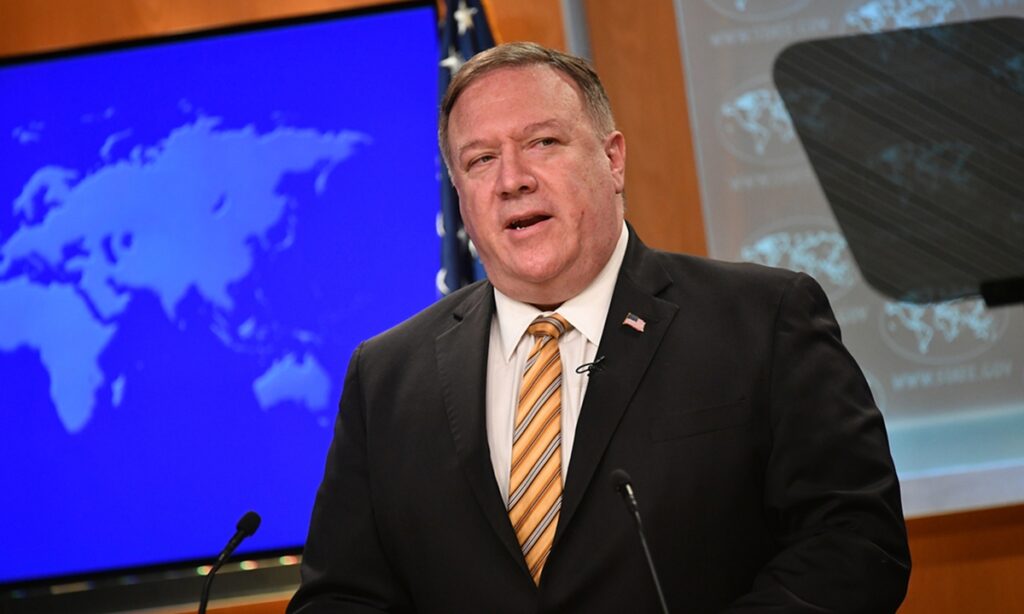US Secretary of State Mike Pompeo’s announcement on lifting restrictions on Taiwan relations broke the bottom line of China-US ties, and the outgoing Trump administration’s last ditch effort on Taiwan is like hanging a sword over bilateral ties with China which will put Taiwan in imminent danger, Chinese experts said.
But given the few days left for the Trump administration, Beijing should take countermeasures mainly with diplomatic means supplemented by military solutions as a “tit-for-tat” response to the “very antagonistic” move, experts suggested.
On Saturday (local time), just 11 days before the end of US President Donald Trump’s tenure, Pompeo announced he was lifting restrictions on contacts between the US’ and Taiwan island’s officials. Pompeo said the US State Department had imposed the complex internal restrictions on itself in an attempt to appease Beijing.
Going forward, executive branch agencies should consider all “contact guidelines” concerning relations with Taiwan previously issued by the US State Department to be null and void, Pompeo said.
Several experts reached by the Global Times on Sunday said that Washington’s move is despicable. On the one hand, it will further worsen China-US relations and set up obstacles for the incoming Biden administration to ease relations; on the other hand, the move would instigate the separatist Democratic Progressive Party (DPP) authorities in Taiwan to respond to the move and do things that would damage cross-Straits relations.
Song Guoyou, deputy director of the Center for American Studies at Fudan University, told the Global Times on Sunday that once the US ends the restrictions, the country will no longer abide by the Three Joint Communiqués which is fundamental to China-US diplomatic relations and this is likely to allow high-level officials to visit Taiwan, which directly harms China’s sovereign interests.
Diao Daming, an associate professor at the Renmin University of China in Beijing, told the Global Times that sending higher level officials to Taiwan is possible in the last days of the Trump administration.
US ambassador to the United Nations Kelly Craft is scheduled to visit Taiwan from Wednesday to Friday after previous visitors like US Health Secretary Alex Azar and Keith Krach, the US State Department’s undersecretary of state for economic growth, energy and environment.
Diao said that different from the previous visits, Pompeo’s latest announcement aims to institutionalize the “official exchanges” between the US and the island of Taiwan, which is “very antagonistic” and breaks the bottom line of China-US relations.
As the clock runs out, the Trump administration is more likely to be in a state of uncontrolled chaos, while Pompeo maximizes his power to make “loud noise” in China-US relations so he can continue to use China issues as his biggest capital in his future political career and add value for himself in the US conservative camp, Diao noted.
But a US observer was quoted by The New York Times as saying that the move is likely to have little practical effect. “It looks like a publicity stunt,” the observer said.
The Chinese experts expressed that after Joe Biden takes office, whether he will continue or cancel the policies launched by the Trump administration needs to be observed, so relations between the US and Taiwan island and China-US ties currently face great uncertainties.
The Financial Times cited on Sunday a Biden transition official as saying that the president-elect had made it clear on the campaign trail that he was committed to the 1979 Taiwan Relations Act, which defined relations with Taiwan, and to the “one-China policy.”
“Once in office, he will continue to support a peaceful resolution of cross-Straits issues consistent with the wishes and best interests of the people of Taiwan,” the official said. “He has long said that American support for Taiwan must remain strong, principled and bipartisan, and he plans to work to ensure that.”
Li Haidong, a professor at the Institute of International Relations of the China Foreign Affairs University, told the Global Times that from the response of Biden’s team, it can be seen that Biden’s future policies on Taiwan question are predictable and stable, and have the characteristics of the past US consensus on the Taiwan question over more than 40 years.
Li noted that the US’ China policy after Biden takes office could be cautious. However, he said that not mentioning the Three Joint Communiqués but mentioning the Taiwan Relations Act signals that Biden’s team is likely to play tricks on some issues, such as how to define “one China.”
Zhu Songling, a professor at the Institute of Taiwan Studies of Beijing Union University, warned China of not expecting much from a Biden administration with regard to reversing many of the Trump administration’s policies.
Diao said that Pompeo ending the limits on Taiwan relations is hanging a sword over China-US ties and the Biden administration will find it hard to repair the bilateral ties that have been under constant strain.
The Biden administration would prefer to hype issues on ideological differences against the Chinese mainland and brag about the so-called democracy on Taiwan island as the model for the mainland, Diao noted.
Song warned that China must pay close attention to the possibility of the Trump administration’s “final frenzy.”
Li said there are many countermeasures that the mainland can take, and it is up to the mainland to decide when to take them and what to do at its own pace.
“At this critical juncture, diplomacy should prevail, with the military as a secondary tool,” Li said.
For example, during Craft’s visit to Taiwan, Chinese military exercises and military aircraft flying over Taiwan Straits were not ruled out to serve as a stern warning, Li said.
US Secretary of State Mike Pompeo File photo: AFP



